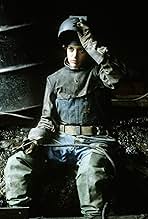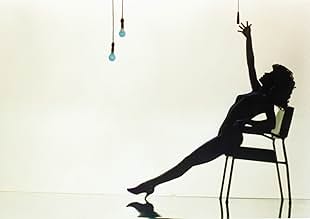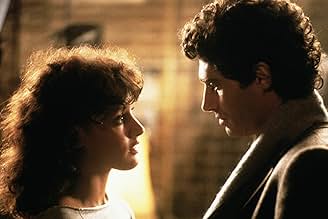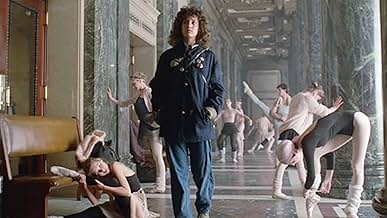Una mujer de Pittsburgh con dos trabajos, soldadora y bailarina exótica, quiere entrar en una escuela de ballet.Una mujer de Pittsburgh con dos trabajos, soldadora y bailarina exótica, quiere entrar en una escuela de ballet.Una mujer de Pittsburgh con dos trabajos, soldadora y bailarina exótica, quiere entrar en una escuela de ballet.
- Ganó 1 premio Óscar
- 13 premios y 16 nominaciones en total
Philip Bruns
- Frank Szabo
- (as Phil Bruns)
Argumento
¿Sabías que...?
- CuriosidadesJennifer Beals' trend-setting collarless sweatshirt came about by accident. The sweatshirt, which Beals brought from home, had shrunk in the wash and she had to cut the collar off in order to get it over her head. When director Adrian Lyne and costume designer Michael Kaplan saw it at the wardrobe fitting, they both loved it and Kaplan improved the overall look of the sweatshirt for the shoot.
- PifiasIn the climactic dance, Alex is played by several noticeably different people.
- ConexionesFeatured in Irene Cara: Flashdance... What a Feeling (1983)
- Banda sonoraImagination
Performed by Laura Branigan
Courtesy of Atlantic Records
Music by Michael Boddicker, Jerry Hey and Phil Ramone
Lyrics by Michael Sembello
Produced by Phil Ramone
Reseña destacada
In recent years there have been a number of British films based on the theme of working-class people who find fulfilment through their cultural activities; examples being Educating Rita (the first and most distinguished), Brassed Off, The Full Monty and Billy Elliott. Such films are frequently described as `quintessentially British' or `something that we can do and Hollywood can't', whereas the truth is that twenty years ago Hollywood was indeed making very similar films, mostly centred upon dancing, such as Saturday Night Fever, Dirty Dancing or Flashdance. Whereas these American films may not have had the covert (or, in the case of Brassed Off, highly overt) political message of their British counterparts, they nevertheless concentrated on differences in social class far more than Hollywood movies usually do.
The heroine of Flashdance, Alex, is a young woman who works as a welder and whose main joy in life is dancing. She moonlights as a dancer in a local nightclub, but her great ambition in life is to become a ballet dancer. The film tells the story of how she achieves that ambition, as well as the story of her romance with a wealthy middle-class divorcee, set against frequent dance sequences as Alex and her ice-skating friend Jeanie go through their paces. The climax comes with a scene in which she auditions for a place at a prestigious ballet academy and treats the judging committee to a bravura display of breakdancing. (Would a ballet school really be prepared to offer a place to a candidate whose dance skills owe more to the disco than to Swan Lake and who seems completely ignorant of balletic idiom?)
The film has its weak points. Although the plot is not as non-existent as some reviewers have felt, it nevertheless tends to take second place to the showpiece dance numbers; at times, it felt as if I were watching an extended series of pop videos. Potentially interesting themes are ignored; for example, Alex is a practising Catholic, but this seems to be a plot device to enable scenes set in the confessional to be used as soliloquies in which she can air her emotional problems. No attempt is made to explore the possible conflict between the demands of her religion and her sexually provocative dancing or her love for a divorcee.
The acting is undistinguished; Jennifer Beals makes an attractive and personable heroine, but it is clear why, despite the success of this film, she did not go on to become a major star. Her acting is too weak to enable her to carry a film; certainly I felt that she would be out of her depth in one that depends more upon plot and less upon song and dance. The other characters are little more than ciphers, with the exception of Hanna, the old lady who acts as Alex's mentor. I could certainly have done without the tasteless ethnic jokes told by Alex's comedian friend.
Yet, despite its faults, I enjoyed this film. Its redeeming feature is the zest and energy of its dance sequences, set to some well-chosen music such as Laura Branigan's Gloria or Irene Cara's title song. It may not be deep or significant, but it is an enjoyable, well-made piece of popular entertainment. 6/10.
The heroine of Flashdance, Alex, is a young woman who works as a welder and whose main joy in life is dancing. She moonlights as a dancer in a local nightclub, but her great ambition in life is to become a ballet dancer. The film tells the story of how she achieves that ambition, as well as the story of her romance with a wealthy middle-class divorcee, set against frequent dance sequences as Alex and her ice-skating friend Jeanie go through their paces. The climax comes with a scene in which she auditions for a place at a prestigious ballet academy and treats the judging committee to a bravura display of breakdancing. (Would a ballet school really be prepared to offer a place to a candidate whose dance skills owe more to the disco than to Swan Lake and who seems completely ignorant of balletic idiom?)
The film has its weak points. Although the plot is not as non-existent as some reviewers have felt, it nevertheless tends to take second place to the showpiece dance numbers; at times, it felt as if I were watching an extended series of pop videos. Potentially interesting themes are ignored; for example, Alex is a practising Catholic, but this seems to be a plot device to enable scenes set in the confessional to be used as soliloquies in which she can air her emotional problems. No attempt is made to explore the possible conflict between the demands of her religion and her sexually provocative dancing or her love for a divorcee.
The acting is undistinguished; Jennifer Beals makes an attractive and personable heroine, but it is clear why, despite the success of this film, she did not go on to become a major star. Her acting is too weak to enable her to carry a film; certainly I felt that she would be out of her depth in one that depends more upon plot and less upon song and dance. The other characters are little more than ciphers, with the exception of Hanna, the old lady who acts as Alex's mentor. I could certainly have done without the tasteless ethnic jokes told by Alex's comedian friend.
Yet, despite its faults, I enjoyed this film. Its redeeming feature is the zest and energy of its dance sequences, set to some well-chosen music such as Laura Branigan's Gloria or Irene Cara's title song. It may not be deep or significant, but it is an enjoyable, well-made piece of popular entertainment. 6/10.
- JamesHitchcock
- 13 ene 2004
- Enlace permanente
Selecciones populares
Inicia sesión para calificar y añadir a tu lista para recibir recomendaciones personalizadas
- How long is Flashdance?Con tecnología de Alexa
Detalles
Taquilla
- Presupuesto
- 7.500.000 US$ (estimación)
- Recaudación en Estados Unidos y Canadá
- 92.921.203 US$
- Fin de semana de estreno en EE. UU. y Canadá
- 4.076.124 US$
- 17 abr 1983
- Recaudación en todo el mundo
- 92.921.203 US$
- Duración1 hora 35 minutos
- Color
- Mezcla de sonido
- Relación de aspecto
- 1.85 : 1
Contribuir a esta página
Sugerir un cambio o añadir el contenido que falta

Principal laguna de datos
By what name was Flashdance (1983) officially released in India in English?
Responde



































